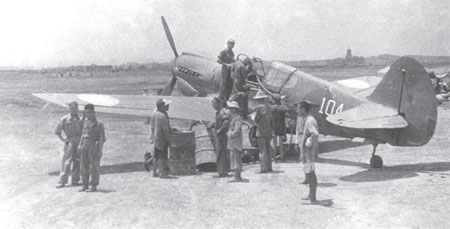WWII Flying Tigers want to see history respected
|
A P-40 Kittyhawk flown by the American Volunteer Group, or Flying Tigers, receives service during World War II. Provided to China Daily |
As the tension between China and Japan deepens since Japan Prime Minister Shinzo Abe's visit to the Yasukuni Shrine, US soldiers who fought in the World War II who were members of the Flying Tigers, shared their stories and called for respect for history and peace.
"I was very angry over the news," said Marty Oxenburg, 91. Oxenburg served about a year in operations supporting the pilots in the 1st American Volunteer Group (AVG), nicknamed the Flying Tigers, to back the Chinese air force in the final battles against Japan during WWII.
Last December, Abe visited the Yasukuni Shrine, where 14 class-A war criminals are housed. The visit invited a series of criticism from countries, including China, Korea and the US. Abe defended his visit at the World Economic Forum last week, which further ignited tension between China and Japan.
"They (the Japanese) never apologize which means they carry on the culture that existed in the war," said Oxenburg, who also said that Japan should learn from Germany regarding attitudes toward WWII.
Lucky enough to survive the war, Oxenburg said that he witnessed the tragedies that happened to his colleagues and local people involved in a war they did not have a choice to avoid.
"One day a plane crashed at our airbase in Yankai, 30 miles north of Kunming. Three Americans were onboard. They had third-degree burns. We got them to a hospital and two of them died," he said. "They were only about 24 or 25. In 1995, I found the families of the two men. I spoke to them and gave them the information they never had."
Having to leave home for the WWII battlefield, Oxenburg never had the chance to witness the birth of his first daughter. His wife, Shirley Oxenburg, wrote to him every day during his service in China, including telling him that his baby was born right after he arrived in Asia.
"I have got over 300 letters. And I named the truck I drove from India to China 'Sugar', the nickname I gave to my wife," said Oxenburg, who with his wife celebrated their 71st wedding anniversary on Jan 31 and the Chinese New Year, a tradition the Oxenburgs started after the war.
"I remember that the moment I got home after the war, I was so excited. Shirley's mother and Shirley jumped on me and I just couldn't get rid of them," he joked. "And for the first time I saw my daughter. She was already 1-year-old."
Nell Calloway, granddaughter of Lieutenant General Claire Chennault who led the Flying Tigers and died in 1958 at the age of 64, said that people should not forget that chapter of history.
"Yes I hate war, but the thing about war is that we need to remember what's happened so that we won't repeat that history. We need to learn how to settle things in a different way," said Calloway, now the director of the Chennault Aviation and Military Museum in Louisiana.
Calloway said that her grandmother, whom she was named after, used to tell stories about having a husband and four sons serve in the war, never knowing if they were going to make it.
But she said it was not until she visited China in 2002 that she started to realize the cruelty of war.
"Most people don't remember that between 1931 when the Japanese first invaded China and 1945, they killed between 25 and 30 million Chinese people. It broke my heart," said Calloway, who says her museum will renovate to show more about how China suffered during the war, in addition to telling the legends of the Flying Tigers.
During the WWII, Calloway's grandfather, General Chennault, used to fly P-40 aircraft. One of the models, a restored P-40 Curtiss Warhawk, is scheduled to be displayed at the National World War II Museum in New Orleans next year.
"We all fought as one to defeat the Japanese. Because the relationship in our world today between China and the United States, I think it's extremely important that we use that to remember that time and work for a better future," said Calloway. "And of course the P-40 Warhawk is such a good reminder of that time."
Ken Mattews, another Flying Tiger veteran, said he was fortunate enough to be the only one from his family who fought in WWII.
"I survived. Thank Lord for that," said Mattews, now 89.
Recalling what he saw on the battlefield as well as the civilian areas, Mattews expressed his disgust with war.
"What they (the Japanese military) did on American soil, Burma soil and Chinese soil would just turn your stomach," he said. "I still haven't got over the hatred I have for the Japanese. But maybe 'hatred' is too strong, 'dislike' would be a more proper word."
Zhang Yang contributed to this story and can be contacted at yangzhang@chinadailyusa.com

























